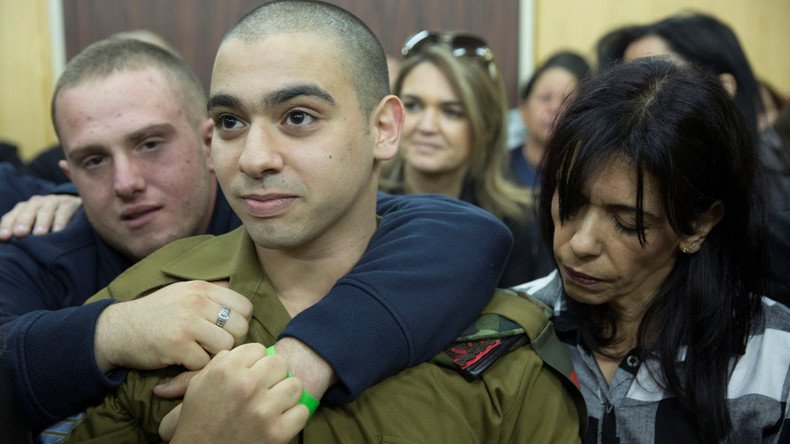Israeli leadership encourages soldiers to ‘shoot to kill’ without justification – rights lawyer

An Israeli soldier who shot and killed an immobilized Palestinian assailant was convicted of manslaughter, but chances are he won’t end up in jail, as many Israeli politicians support the soldier, experts say.
A guilty verdict was handed down on Wednesday to an Israeli soldier who shot and killed an injured Palestinian attacker. Elor Azaria, 20, a soldier of the Israeli Defense Forces (IDF,) shot the injured man, Abdul Fatah al-Sharif, 21, in the West Bank city of Hebron in March 2016.
The court stated that the Palestinian man posed no threat and there was no justification for the killing.
Clashes broke out between police and supporters of the soldier while the hearing was taking place. The convicted soldier has a lot of support among Israelis; many say he is a hero.
Israeli Prime Minister Benjamin Netanyahu urged President Reuven Rivlin to pardon the soldier.
RT asked lawyer Rami Saleh, a director at the Legal Aid and Human Rights Center, what message this sends out to other Israeli soldiers.
“The problem is that the Israeli leadership is encouraging the policy of shoot to kill even in case an attacked [person] does not pose a threat,” he said, adding that this is a “violation of international law.”
“The Prime Minister himself is encouraging the Israeli soldiers to conduct the same action,” Saleh said.
He argues that Azaria committed a “coldblooded” murder and there are dozens of similar cases in which Israeli soldiers kill Palestinians even when they “don’t pose much threat.”
BREAKING: #IDF soldier who shot & killed immobile Palestinian assailant convicted of manslaughter https://t.co/mzlBsPJCDK
— RT (@RT_com) 4 января 2017 г.
“The case of al-Sharif had very good echo in the media only because it was recorded on a video and it was on YouTube,” Rami Saleh told RT. In his opinion, it would have been difficult to bring Azaria to “this stage at the court” if the incident had “not recorded and documented properly.”
Sgt. Azaria is now facing 20 years in jail for manslaughter. Sentencing is expected to be announced in the next several weeks. Meanwhile, the defense team said they would appeal the verdict.
“We are not talking about a final decision,” Saleh said, commenting on Wednesday’s verdict. “There is a very good opportunity to appeal against the decision... by the military court. Why? Because most of the Israeli politicians are supporting the soldier and are saying that it is inappropriate that he will be sent to jail.”
According to Saleh, there have been “many cases” when “really harmless” Palestinian “children” were killed at checkpoints. He recalled an incident with Israeli forces allegedly killing a young Palestinian woman and her teenage brother at a military checkpoint between the cities of Ramallah and Jerusalem.
#Netanyahu calls for pardon of #IDF soldier convicted of killing wounded Palestinian attacker https://t.co/dApDBpkhRg
— RT (@RT_com) 5 января 2017 г.
“One of the cases that our organization has followed – was Maram and her brother [Ibrahim.] He was a youngster – less than 18 years, and they were both shot [at] the Qalandiya checkpoint, because the soldiers considered them threatening to the soldiers,” the lawyer said.
In his view, the “Israeli legal system is not conducting justice” and “many Israeli soldiers” involved in similar cases in the past were only sentenced to “less than a year” of public service.
Sahar Francis, director of Addameer human rights organization, also thinks that it’s unlikely that Sgt. Azaria could end up spending many years behind bars.
“Even if the court sentences him, the maximum sentence in this case could be 20 years. Even if gets the maximum sentence, I don’t believe that he would spend all the sentence [in jail],” she said.
‘Israeli shoot-to-kill policy belongs to western movie laws’ – HRW official to RThttps://t.co/eW8J548xOe
— RT (@RT_com) 4 января 2017 г.
RT spoke to people outside the court on Wednesday. One woman said that there were incidents in which wounded Palestinians went on to attack people, despite their injuries.
According to Sahar, this does not serve as justification for the Israeli soldier’s actions.
“The court decided that there was no justification: the guy, the Palestinian, Abdel-Fattah al-Sharif, was paralyzed and was shot. Actually opening the... standards – first they have to shoot in the air to warn, and then in the legs. In all of the cases that we documented in the last year it was shooting in the upper side of the body. It means there is an intention to kill,” she said.
The statements, views and opinions expressed in this column are solely those of the author and do not necessarily represent those of RT.












